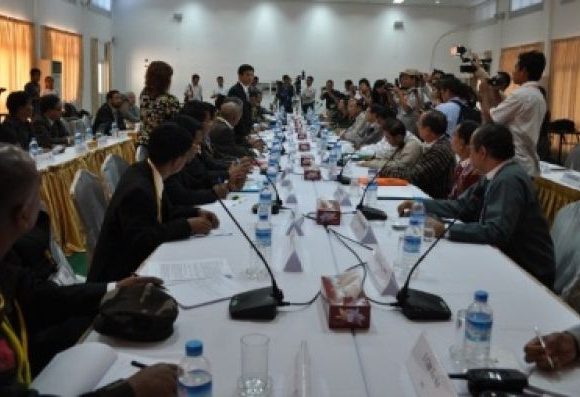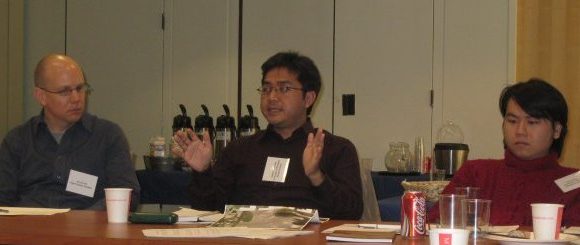The prospect of Burma transforming into a democratic state from the totalitarian rule seems to be diminishing as the junta gear up their effort to implement their own seven-step road-map to the so-called ‘disciplined democracy’.
The fact that the regime is hell-bent on its own road-map is clearly indicative of the considerable weakness of the democratic opposition of Burma as a whole. For the last 18 years since Burma ‘s 1990 general election, the military junta shows no real sign of flexibility and willingness to find a negotiated settlement of the country’s long crisis with the democratic opposition. As long as the regime sees no potential threat to their power from the opposition, no one should be under any illusion that the military regime will actually hand over power or make a concerted effort to compromise.
It should always be noted that the junta leadership will try to cling to power at all costs. That is a given. While safeguarding themselves from opposition forces, the regime will neither initiate nor support a genuine democratic reform effort unless their power is threatened. Only if there is enormous and irresistible pressure, will the repressive regime be open to negotiating with the democratic opposition. The sad truth is that a transition to democracy for an authoritarian country does not come without cost and enormous sacrifice. Drawing lessons from countries going through such transitions, the first step towards democracy often begins with a crisis caused by the authoritarian regime which degenerates into a peoples’ uprising, followed by mass riots, and a nation-wide protest against the ruling government which eventually leads dictators in power to step down. We have had more than our fair share of such crises and uprisings in Burma , yet the regime continuously consolidates its power. It’s become clear that without concerted and persistent efforts to resist and discredit the military junta – especially from the inside – the people’s demand of democratic reform seems impossible.
Take the case of South Africa , where the xenophobic “national party” governed the country from 1948 to 1994. Despite the apartheid regime’s oppression of the opposition, the democratic movement relentlessly tried to create a crisis with the goal of making the country ungovernable. In time, the democratic movement propelled the government to negotiate with the opposition. Even when the main opposition force – the African National Congress – was banned, the opposition managed to organize a dramatic series of events, including the student uprising in 1976; an anti-apartheid campaign that ground down the South African economy; and most importantly, the continued effort of the United Democratic Front (UDF) which tried to destabilize the country into chaos in order to achieve their goal of “making South Africa “ungovernable, ” as their slogan stated. To crack down on the UDF-led “people’s power” opposition movement to make South Africa ungovernable, the apartheid regime under the leadership of P.W. Botha employed different military strategies. However, the Botha apartheid regime’s heavy-handed military strategy failed as the opposition movement grew stronger and stronger.
Having seen the failure of Botha’s oppressive military strategy in trying to contain and eliminate the campaign of ungovernablity, the successive leader, F.W de Klerk, had no choice but to install a legitimate government by sharing power with the opposition leaders when he took office in 1989. With that power-sharing negotiation, we saw the eventual success of democratic movement in 1994. In retrospect, the success of the democratic movement in South Africa could not have been possible without the persistent and courageous efforts of the United Democratic Front, the front that led South African peoples of all walks of life to join their movement against the oppressive apartheid regime. Note that the UDF nation-wide movement was initiated and led by Prominent leaders of the UDF such as Archbishop Desmond Tutu and Rev. Alan Boesak to name a few, while African National Congress leader Nelson Mandela was imprisoned.
The South African example demonstrates that democratic forces can be effective despite the fact that an authoritarian regime will do whatever it can to stay in power even to the extent that it will employ military forces to suppress the opposition. In the case of South Africa , democratic forces of South Africa were not only within the country, but also in exile. Locals and expatriots both employed a variety of means to discredit the apartheid regime. In 1994, their efforts forced an end to the country’s four-decade long apartheid regime.
When this lesson is applied to Burma , no one would dispute the fact that Burmese citizens from all walks of life have done their part in protest of the repressive military regime. Sadly, thousands of peaceful demonstrators have already died in cold blood. So far, all the sacrifices that they made for our country have not resulted in the just cause they were fighting for. Again and again, sporadic and occasional uprisings against the Burmese military junta have proven that a genuine democratic reform is unachievable without the persistent and co-ordinated effort of a nation-wide people’s movement
While Daw Aung San Suu Kyi is crippled the same way Nelson Mandela once was, it is unfortunate that the other main opposition leaders in Burma today (unlike leaders of the United Democratic Front in South Africa) cannot provide overall strategic and organizational leadership. For the last 18 years since 1990, the main opposition leaders inside Burma – most MPs elected in 1990 – are doing nothing more effective than issuing statements. One can’t help but wonder, is that what they were elected for? When the people of Burma gave them a mandate to govern in 1990, they did so in fully believing that those elected representatives would responsibly and courageously stand up to serve the national interest of the country and protect them against the authoritarian rules of the military dictatorship. It is unfortunate that none of their expectations have been met. Given that the opposition leadership has been thrown into total disarray at this point in our history, it is unimaginable that Burma will have competent and dedicated opposition leadership equivalent that of the United Democratic Front Movement. That said, we must now strive to ‘make Burma ungovernable’ untill the junta is forced to cede to the demands of the people and reinstall civilian rule.
The task is ours for the taking. While Daw Suu and some political figures are under house arrest and in jail, it is paramount that those who have been elected in 1990 take charge of leading the movement, particularly people’s power movement. They must do so by relentlessly organizing a persistent nation-wide peoples’ movement by instigating civil disobedience against the military regime. As a grand strategy, when leading the opposition movement, they should be offensive rather than defensive and pro-active rather than reactive in discrediting the illegitimate rulers. More aggressively than ever before, it is necessary that the democratic opposition should devote resources, both human and material, towards strengthening the movement inside Burma . The fight for democracy in Burma must be vigorously carried on not just because it is possible, but because it is necessary.
By Salai Za Ceu Lian
21 October, 2008






